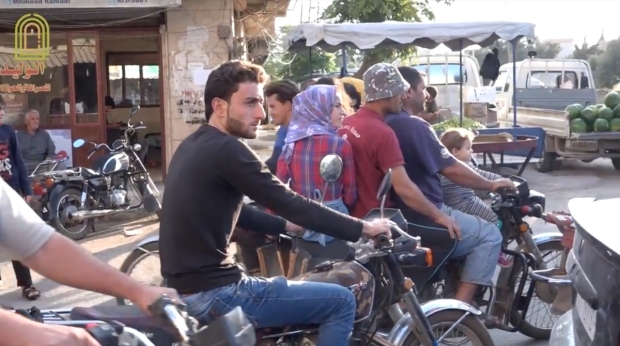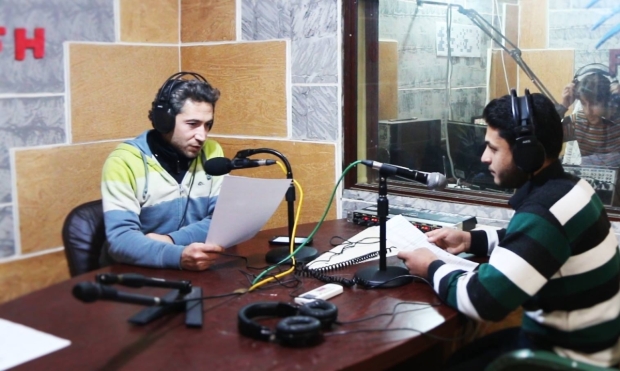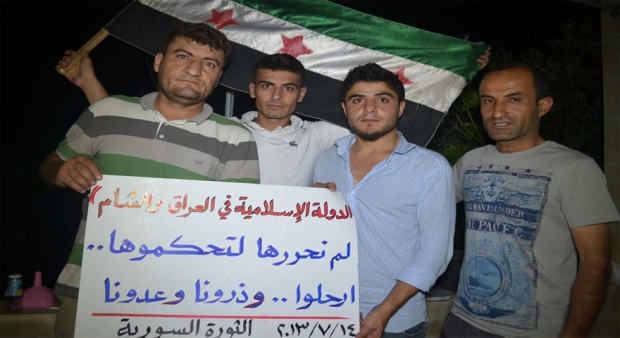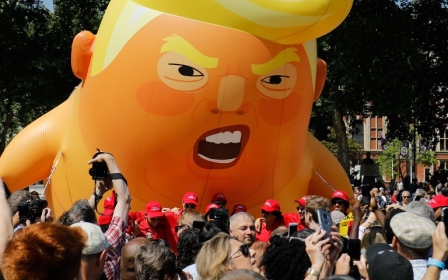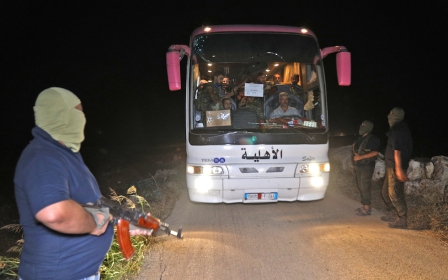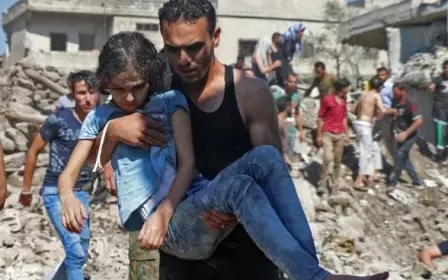'Forced to take arms’: Syrian civil society turns to factions after US funding freeze
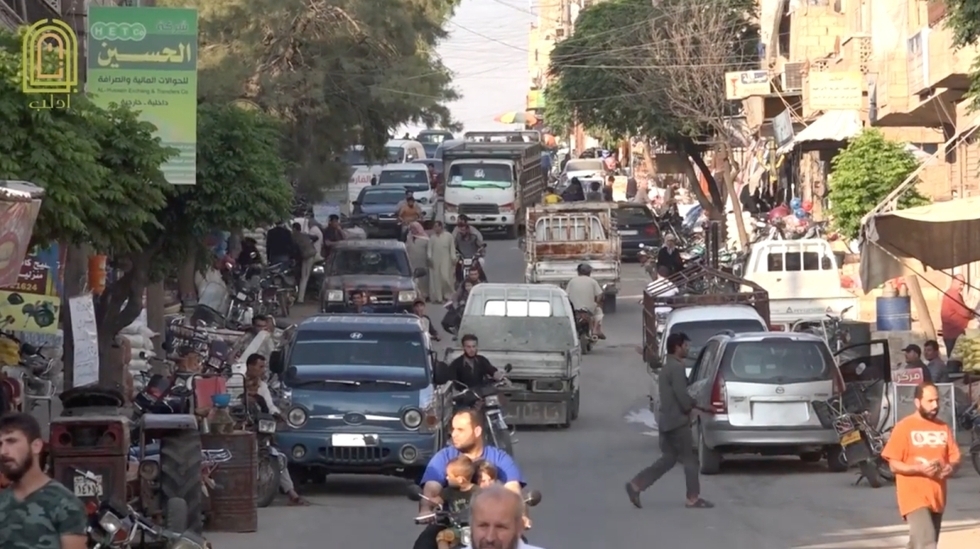
AMMAN - Joining a hardline Islamist faction was never part of Khaled Abdul Kareem’s plan.
Just a few months ago, the father of two was steadily employed as a logistics officer with the Union of Revolutionary Bureaus (URB), a collection of US-funded civil society organisations in Syria’s northwestern opposition-held Idlib province.
The work was reliable and with the help of a monthly salary of $100, Abdul Kareem’s office was a relatively stable place to earn a living in a country at war. “I delivered the goods on time,” he recalled, “and I was truly dedicated to the job.”
'I’m fundamentally opposed to all of their policies, but I need money to provide for my children'
- Khaled Abdul Kareem, former Union of Revolutionary Bureaus employee
But at the end of March, the Trump administration announced a freeze on some $200m in stabilisation aid to Syria. The URB was one of at least 150 recipient organisations whose funding abruptly came to a halt.
Within a matter of weeks, Abdul Kareem and more than 650 other employees at the union were thrust into a vast pool of unemployed residents in the northwestern rebel-held territory, where more than a million displaced people fleeing reconciliation agreements and pro-government offensives across Syria have gathered alongside rebel fighters, activists and those wanted for mandatory military service.
Hundreds of the URB’s former employees are now working on a voluntary basis to maintain operations as the organisation’s leaders desperately seek alternative sources of funding, URB president Raed Fares told Syria Direct. But others have turned toward the patchwork of armed factions ruling the area to look for much-needed income.
Abdul Kareem quickly found a job with hardline Islamist coalition Hay’at Tahrir a-Sham (HTS), the dominant faction in Idlib and formerly al-Qaeda’s Syrian counterpart Jabhat a-Nusra. HTS was designated a terrorist organisation by the US government in May.
“I’m fundamentally opposed to all of their policies,” said Abdul Kareem, who now serves on the faction’s police force, “but I need money to provide for my children.”
Two other former URB employees who spoke with Syria Direct found positions within Free Syrian Army (FSA) factions. All three men now carry a weapon on a daily basis. They asked that their real names be withheld in this report, fearing repercussions from local rebel groups.
The sudden shift from office jobs to frontlines reflects the fragility of a nascent Syrian civil society movement that often hinges on shrinking pools of foreign aid - and the potential for armed groups with deeper pockets to fill the void left behind by funding cuts.
‘What are the US administrators thinking?’
One morning in May, URB president Fares opened his computer to find an email from the US State Department informing him, “with great regret,” that funding for his union would soon cease.
“I was shocked,” he remembered.
“Thoughts began to spin in my head,” he said, like, “What are the US administrators thinking?”
Stabilisation assistance seeks to eliminate the “instability that terrorist and criminal organisations and competitors exploit,” and instead establish conditions for local authorities to “peaceably manage conflict and prevent a resurgence of violence,” according to a recent multi-agency review of US stabilisation efforts worldwide.
The funds have reached local governance bodies and civil society organisations across opposition- and Kurdish-held areas of the country that provide essential services - like electricity, education and sanitation - in the absence of formal Syrian government structures. Funds have also been used to document rights abuses, rebuild critical infrastructure like water networks and power plants and clear mines left behind by the Islamic State group (IS).
All of these projects were put on the line following the State Department’s announcement in March, which will take effect gradually, depending on individual contracts and implementation agreements on the ground. Some projects have already ground to a halt. Others are being sustained by alternate donors, including European governments reportedly reluctant to pick up the slack.
In what seems to be the only official exception to the funding freeze made thus far, the State Department announced that President Donald Trump had authorised the continuation of $6.6m in stabilisation funding to the Syrian Civil Defense - also known as the White Helmets - which operates in remaining rebel-held territories.
But otherwise, funding cuts that affect the northwest region in particular appear to be final, development workers tell Syria Direct. The fate of funding for other areas of the country - including former IS-held territory in the northeast - remains unclear, with funds still under review.
The State Department did not respond to multiple requests for comment for this report.
At the Union of Revolutionary Bureaus - where more than $3m in US funds has been implemented in recent years - paid work in most of the union’s offices officially came to a stop more than a month ago.
Although limited funding from other international organisations has been enough to keep 12 local children’s centres open, a number of centres dedicated to women’s empowerment and adolescent support are now temporarily closed because the operational costs were too high. Volunteers are maintaining other activities for the moment, including medical services, athletics programs and the most widely listened-to radio station in opposition-held Syria: Radio Fresh FM.
“Everyone still has hope that we’ll find an alternate funding source,” said Fares, who is courting donors in the US and beyond in an attempt to preserve the work he helped launch years ago as a community leader in central Idlib province’s Kafr Nabl, the once-sleepy town whose vocal residents earned it the moniker of “conscience of the revolution”.
But cuts are already beginning to bite, pushing some employees to look for alternative work in a northwestern province where displaced persons make up more than half the population and most people rely, at least in part, on humanitarian aid to get by.
‘I never imagined that one day I’d head to the frontlines’
With work already hard to come by, residents say that the myriad opposition groups on the ground in Idlib can provide a key source of employment.
“Searching for a job in the north is like looking for a needle in a haystack,” said Muhammad al-Ali, a 27-year-old native of Kafr Nabl. “We’ve been forced to take up arms in order to survive.”
“I never imagined that one day I’d leave my job, join an armed group, carry arms and head to the frontlines,” the father of two says. “I was forced to do so in order to provide for my family.”
Ali now moves throughout the rebel-held northwestern countryside, monitoring dormant frontlines facing government-held areas while reconnaissance planes circle overhead. It’s a role that earns him about $100 every two months - half of what he made at Radio Fresh.
Ali’s former colleague at Radio Fresh, Muhammad Ahmad al-Mahmoud, said he made a similar move after the aid cuts left him “looking for any job in order to survive".
He found work with the FSA-affiliated National Liberation Front, as part of the group’s media team. The former radio editor now carries a weapon alongside his camera, documenting the battles on the ground rather than from the Kafr Nabl office where he still volunteers a few hours of his time each week.
But even with his monthly salary of about $130, Mahmoud says debts are piling up.
“Everything, from food and drink to rent, is extremely expensive,” the 27-year-old father of five said. “The costs are greater than a person’s income.”
HTS ‘eager and willing to step in’
Should the US funding freeze remain in effect, civil society and development workers warn that armed groups will fill the resulting power vacuum, providing services that donor-funded civil society organisations and governance institutions have taken responsibility for - and that residents have come to depend on.
That delicate dependency formed in the absence of both a formal governing structure and a formal economy in rebel-held Syria, explained Mark Strohbehn, Senior Program Manager for Syria programs at the Washington, DC-based firm Development Transformations (DT), which is the State Department’s largest contractor for civil society programmes in Syria.
Across opposition areas, “local actors are required to rise to the occasion of meeting community services,” he told Syria Direct. However, those actors - be they local councils or civil society organisations - rarely have sufficient funding on their own, he said. Even when local councils and other governance institutions have implemented taxation plans, results have been mixed and costs have still proven excessive.
US funding has been multiple times greater than that provided by any other donors operating in a similar capacity, he said. And with no indication that US funding will continue in the northwest, Strohbehn fears residents of rebel-held Syria will turn to better-funded - and more extreme - entities for support.
Strohbehn is concerned that a comprehensive cut to funding “opens the floodgates for...whoever has the biggest pocketbook and the strongest military resources to run the show".
In Idlib, as well as portions of neighboring Aleppo and Hama provinces, that title goes to HTS, which is estimated to bring in tens of millions annually through ransom payments, a network of foreign donors and control over local resources and infrastructure.
'How can those who call for the fight against terrorism stop support for civil society organisations in an area teeming with terrorism?'
- Ra'ed Fares, URB president
HTS is not only the dominant military force in the northwest, but also maintains a growing presence in administrative and civil affairs through the Syrian Salvation Government (SSG) - a civil authority formed in late 2017 and backed by the hardline group.
Since its founding, the SSG has sought to usurp local governance by challenging the opposing, western-backed Syrian Interim Government and asserting its strict interpretation of Islamic law on residents of the province.
“HTS is eager and willing to step in” and provide community services like those funded by stabilisation assistance, said Strohbehn. By doing so, the group may “gain greater control over how people are required to live their life,” he added.
It is a fear shared by URB president Fares, a longstanding, outspoken opponent of the northwest’s Islamist factions and manager of the Radio Fresh station. “The vacuum that we leave behind will be filled by terrorist groups,” he warned.
Radio Fresh offices and employees, including Fares himself, have been targeted multiple times by armed individuals and groups including HTS’ former iteration Jabhat a-Nusra and IS, which has maintained itself as a threat to the northwest through a campaign of sporadic IED attacks and assassinations.
Fares says he was particularly puzzled by the US decision to freeze funding considering the increasingly narrow policy focus on the pursuit of terrorist groups in Syria—rather than Assad—after the Trump Administration took power.
“How can those who call for the fight against terrorism stop support for civil society organisations in an area teeming with terrorism?” he asked
The decision to cut stabilisation assistance in the northwest is “basically cutting losses at this point,” one former Pentagon official and policy analyst, Melissa Dalton, told news site Axios. A final battle for Idlib province now looks imminent following a string of rebel defeats elsewhere in the country, and the fate of 2.5 million residents remains unclear.
But despite the potential for renewed violence in the north - and the daunting task ahead for organisations scrambling to secure new funding - Fares said he remains committed to building up civil society, which he sees as essential to a “future Syria that will respect the rights of its citizens regardless of sect or ethnicity".
“Civil society is the only tool by which we can reach that point.”
Read the original article on Syria Direct. Follow Syria Direct on Twitter.
New MEE newsletter: Jerusalem Dispatch
Sign up to get the latest insights and analysis on Israel-Palestine, alongside Turkey Unpacked and other MEE newsletters
Middle East Eye delivers independent and unrivalled coverage and analysis of the Middle East, North Africa and beyond. To learn more about republishing this content and the associated fees, please fill out this form. More about MEE can be found here.


